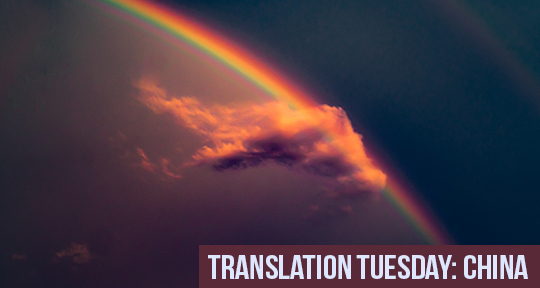This week, Gaza’s reading community reels from the devastating loss of a beloved bookstore, and Sweden debates a new library to promote freedom of expression. In Hong Kong, leading literary voices pay homage on the anniversary of the 1989 Tiananmen Square protest, even as the annual Victoria Park vigil was canceled due to coronavirus concerns. Tour the literary world without leaving home; Asymptote‘s editors-at-large will punch your passport.
Carol Khoury, Editor-at-Large, reporting from Palestine
When his mobile phone rang at 6 a.m. on Tuesday, May 18, Samir Mansour was not asleep anyway, as the bombardment of Gaza was still on. The caller, the Israeli military, was asking if Mansour was inside his bookshop and publishing house, as they “didn’t want to hurt” him. They hung up, and shortly after, their shells reduced what was once “happy and loving memories” to a pile of rubble.
The beloved local bookshop, which stood on the ground floor of a larger building, was one of the two blockaded Gaza Strip’s largest sellers of books. The other bookshop, owned by Shaban Aslim, was also destroyed by an airstrike the same week. Mr. Aslim spoke of the work he put into creating his store in an interview, saying “this was my dream that cost me so much.”
To Palestinians living in Gaza, the two bookstores played a key role as a center of intellectual life, and their destruction represents the wider loss of culture in Gaza. Mansour’s bookshop, located near several universities, was also the unofficial home of several English-language book clubs, and printed and published works by local authors for the past twenty-one years. “Books are my life,” said Mansour, who would like to rebuild his store one day. Hopes are high that the bookstore will be rebuilt with donations after an online fundraiser was set up and managed by human rights lawyers.
A post to the bookshop’s Instagram page laments the loss of the sense of community the store offered to people in Gaza. But not all stories are lost! Tareq Hajjaj’s piece in Middle East Eye gives a glimpse of fear and loathing in Gaza from before the latest war. The Palestine Book Award, now celebrating its tenth year, is publishing Writing Palestine, with Arabic and English texts, which “uniquely brings together revered names.” The Award’s list of winners honors and endorses the best written in English on Palestine. And do not miss M. Lynx Qualey’s list of seventeen new books by Palestinian writers worth reading. READ MORE…





